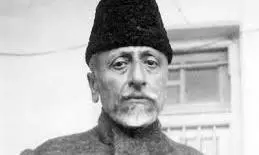
Who can erase Maulana Azad?
text_fieldsMaulana Azad, India's First Minister of Education
The current administration of the country has a serious lack of confidence in whether it can win another term if a free and fair election is held, even though the leaders are bragging on all platforms that they will win 400 seats in the upcoming election and retain power. The anxiety of not getting another term forces any government to take some decisions and implement policy programs in a hurry even in the last weeks of the administration period. News came out the other day about such a hasty decision. Maulana Azad Education Foundation under the Union Ministry of Minorities has been terminated.
Also read: NCERT now removes Maulana Azad's reference from Class 11 textbook
It has been ordered to terminate the contract employees, hand over the assets to the Central Waqf Board, and submit the closure certificate as soon as possible. Maulana Azad is someone who set a great example of fearless journalism, spent a good part of his life in jail and on the streets for the country's independence, strongly opposed partition, and played the role of the architect of higher educational and cultural institutions including the Sahitya Akademi, IITs, AIIMS, UGC. The Foundation came to being in the birth centenary year of the First Minister of Education of India. Since its inception in 1989, the Foundation has been focusing on activities aimed at educational advancement and employment opportunities for the marginalised and backward communities of the country. Why would a government suddenly decide to do away with such an institution? Is it that backward and marginalised groups, including Muslim minority communities, have overcome all educational crises? The data of the All India Higher Education Survey 2020-21 shows that the number of Muslim students getting admission to higher education institutions has decreased significantly. This is the case in almost every part of the country, especially in states ruled by BJP governments. The only exception is Kerala, where 43% of Muslim students seek higher education. It is not new that the educational advancement of the backward-marginalised society does not figure in the main agendas or even remote considerations of the present central government. By overturning the Reservation and Right to Education Act, cutting scholarships, banning the hijab, closing down madrassas, and alleging falsehoods like Mark Jihad, the authorities are looking for ways to keep minority students away from schools.
Also read: IUML's student wing protests Centre cancelling Azad Fellowship
It is indisputable that the reactionary political objective behind this decision is to wipe the memories and ideals of a national leader like Maulana Abul Kalam Azad from the face of the earth along with creating obstacles for the promotion of minority education. Earlier, Maulana Azad's name had been cut from the section on constitution-making in the NCERT textbook. The Maulana Azad National Fellowship, which was given to students from minority communities for higher education and research, was also terminated. Now Maulana Azad Education Foundation is also closed. It is clear that the Modi government is counting on erasing the memory of the Muslim leader who was the forerunner of the freedom movement, just as it is erasing the institutions and projects named after the father of the nation, Mahatma Gandhi and the first prime minister, Jawaharlal Nehru. He has been erased from the picture gallery of freedom struggle heroes. Supporting these moves are many ranging from the media to the Sangh Parivar loyalists of the Indian National Congress, where Azad was twice crowned as the All India President. But even if the government and the media decide so and the institutions are closed down, will it erase the legacy of the First Minister of Education who laid the foundation of the nation's education by making schooling compulsory till a child is 14 years old? Will the Modi government abolish all the IITs, Academies, and UGC - all of which are the brainchildren of Azad?
Also read: BJP accuses Siddaramaiah of appeasing PFI 'goondas' by lifting hijab ban
Maulana smiled and looked at the face of the British court that accused him of treason and said: "You keep writing your judgments until the doors of another court open." He would be smiling in another world as he learns of the steps taken by the government to erase his traces.























